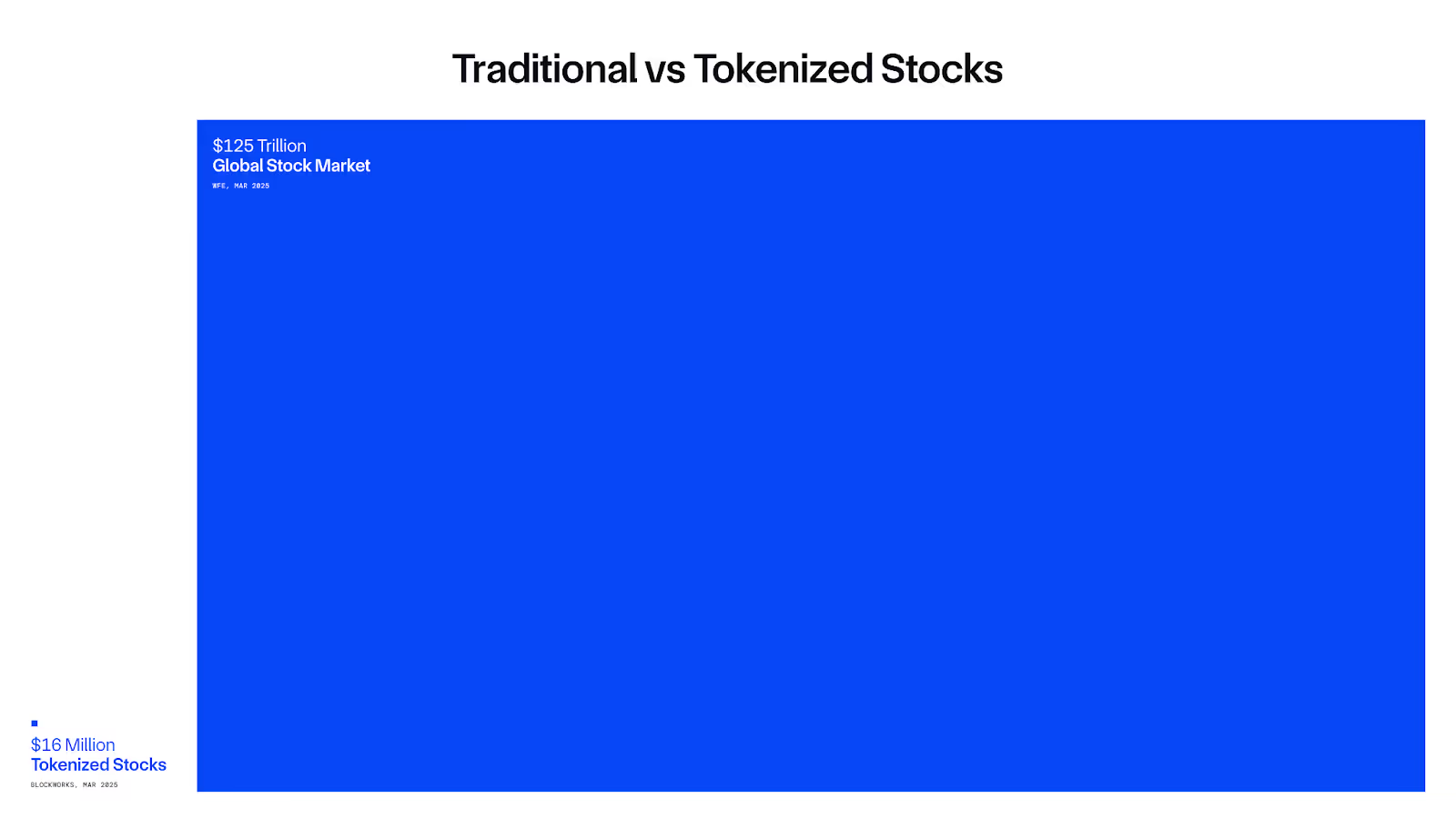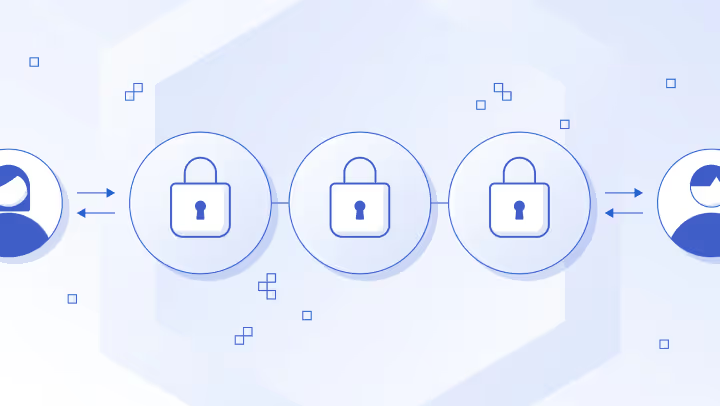Tokenized Stocks & Equities Explained
Tokenized stocks and equities are digital representations of company shares on a blockchain. Tokenized stocks represent publicly traded shares, such as those traded on the S&P 500 index while tokenized equities represents shares in private companies.
Tokenized stocks and equities bring traditional share ownership into the onchain economy. By representing ownership on a blockchain, they can enable 24/7 trading, global accessibility, DeFi composability, and instant settlement. This shift opens the door to more efficient, accessible, and liquid global markets.
Whether it’s public stocks or equity in a private company, tokenization is changing how market participants issue, trade, and manage investments. It also introduces new challenges around regulation, custody, and interoperability. Chainlink’s infrastructure enables tokenization use cases by providing the secure data, compliance, and interoperability services needed to bring value onchain.
What Are Tokenized Stocks?
Tokenized stocks are blockchain-based tokens that represent shares of publicly traded companies and mirror the price of the underlying stock.
There are three primary types of tokenized stocks:
Natively issued tokens—Native tokenization involves companies issuing their own shares directly onchain, without using an intermediary or wrapper. The blockchain becomes the primary source of truth for ownership records, with tokenized shares representing original equity rather than mirrored or wrapped versions.
Wrapped tokens—Wrapped tokens are issued onchain and backed by publicly traded shares held with a licensed and regulated custodian or broker-dealer. Each token mirrors the price of the underlying stock.
Synthetic tokens—Synthetic tokens are onchain derivatives that use oracle data to track the prices of real-world assets such as stocks without holding or being backed by the actual asset. These tokens enable onchain exposure and 24/7 trading.
Regardless of the structure, tokenized stocks must rely on trusted infrastructure to maintain compliance, accurate pricing, and ownership records.

Key Benefits of Tokenizing Stocks
- Global access: Investors in supported jurisdictions can access tokenized stocks without needing to go through traditional brokerages or local exchanges.
- 24/7 access: Some tokenized stocks may trade outside of regular exchange hours—even on weekends—depending on the trading platform and token structure.
- Programmable compliance: Smart contracts can enforce KYC/AML checks, restrict access to eligible investors, and automate regulatory rules based on jurisdiction.
- Onchain transparency: Public blockchains track token transfers and balances in real time, improving auditability and reducing settlement risk.
What Is Tokenized Equity?
While tokenized stocks typically represent publicly listed shares, tokenized equity expands this definition to include private shares—i.e., shares that don’t trade on a listed stock market. Private markets are typically less liquid and efficient, meaning they stand to benefit more from tokenization.
Tokenized equity offers companies a new way to raise share capital, issue shares, and manage ownership records onchain. Instead of using traditional cap tables, companies can track share ownership through blockchain-based applications.
Benefits of tokenizing equity include:
- Global reach— Startups can raise funds from a more global investor base, and investors can gain exposure to opportunities that were previously restricted or illiquid, such as private equity in companies like SpaceX or OpenAI, as recently offered by Robinhood.
- Programmable share ownership—Cap tables can update automatically with each token transfer.
- Regulatory control—Depending on the jurisdiction, private shares might only be available to investors who meet certain accreditation requirements. Issuers can embed tailored regulatory checks and controls directly into smart contracts.
Equity tokens are usually classified as securities and must comply with local laws. Platforms are emerging to help with issuance, investor onboarding, and secondary trading in a compliant way.
Tokenized Equity in Digital Trading
Tokenization enables a new model of trading—one that is blockchain-native, permissionless, and operates around the clock. Smart contracts allow investors to trade tokenized shares directly, without intermediaries. This reduces friction, costs, and settlement times.
By integrating with DeFi protocols, tokenized equities can unlock even more use cases:
- Lending—Tokenized shares can serve as collateral.
- Yield—Tokenized equity can earn returns via liquidity pools and staking.
- Instant settlement—Trades can clear in seconds, not days.
This peer-to-peer model of finance opens the door to more inclusive capital markets—so long as tokenization remains secure, compliant, and trusted.
Key Benefits of Tokenizing Equity
Tokenization offers seven potential advantages over traditional equity systems:
- Global access—Investors worldwide can participate more easily.
- Continuous Availability—Tokenized shares can trade 24/7 on global platforms.
- Transparency—Onchain records provide a real-time audit trail.
- Fast settlement—Smart contracts can settle trades in seconds.
- Lower costs—Fewer intermediaries mean lower fees.
- Programmable compliance—The token logic can have pre-programmed restrictions.
How Chainlink Enables Tokenized Stocks and Equity at Scale
Tokenized equity needs reliable data, automation, and interoperability to function effectively. Chainlink provides critical infrastructure for tokenized equity markets to operate reliably and securely, and aids alignment with real-world events and regulations.
- Automated Compliance Engine (ACE) - Enables real-time policy enforcement, identity verification, and access controls for tokenized assets across chains. ACE integrates with global identity standards like vLEI and ERC-3643 to ensure only eligible participants can interact with tokenized stocks and equity, supporting compliance at scale.
- Cross-Chain Interoperability Protocol (CCIP)—Enables secure messaging between blockchains so data and assets move securely across networks. CCIP also supports programmable token transfers. This enables atomic settlement (where delivery and payment occur in a single, indivisible transaction) and allows optional onchain compliance checks. For example, a user could exchange a tokenized Apple share on Ethereum for a stablecoin on Avalanche.
- Proof of Reserve—Verifies that custodians hold the real shares and that the tokens are fully collateralized. It enforces secure minting by verifying asset backing onchain before creating new tokens.
- SmartData—Chainlink provides tamper-proof net asset value data for tokenized funds, including those containing equities. This helps ensure accurate onchain valuations.
- Price Feeds—Tokenized stocks need accurate price data from the underlying market. Chainlink Price Feeds deliver real-time stock prices from high-quality data sources.
Real-World Examples of How Chainlink Enables Stocks and Equity Tokenization
Several real-world projects are already using Chainlink infrastructure to support tokenized stocks and equities.
Backed
Backed is a platform that issues onchain tokens backed one-for-one by real-world assets like stocks, ETFs, and commodities. These tokens are freely transferable between wallets and trade on public blockchains. Chainlink’s infrastructure plays a critical role—providing price feeds to track the asset, Proof of Reserve to confirm backing, and CCIP to enable secure cross-chain transfers. As of mid-2025, Backed-issued stocks bCSPX, bCOIN, and bNVDA represent almost 90% of tokenized stocks in value.
xStocks
xStocks is a tokenized stock product suite from Backed that brings real-world equities like Apple and Amazon onchain as freely transferable, 1:1-backed tokens. These assets are live on centralized platforms like Kraken and Bybit, as well as DeFi protocols on Solana. Chainlink supports xStocks with secure price feeds, Proof of Reserve, and cross-chain functionality via CCIP, enabling trading and interoperability across multiple blockchains including Solana.
21X
21X is the first EU-regulated distributed ledger technology (DLT) trading and settlement system. The platform will support tokenized stocks, bonds, and other real-world assets across blockchains. 21X has partnered with Chainlink to enable onchain secondary market price feeds for bid and ask prices. It also plans to use Chainlink’s Cross-Chain Interoperability Protocol (CCIP) to provide access to assets and stablecoins across multiple blockchains.
Aktionariat
Aktionariat is a Swiss equity tokenization platform that helps private companies issue shares onchain in compliance with Swiss DLT law. It supports over 70 companies and more than 30,000 registered investors. By integrating Chainlink CCIP, Aktionariat enables secure multi-signature treasury accounts that work across Ethereum, Optimism, and Polygon. This forms the foundation for expanding into cross-chain tokenized equity.
Swarm Markets
Swarm Markets tokenizes U.S. stocks and other real-world assets. By integrating Chainlink CCIP, Swarm enables secure cross-chain transfers of tokenized stocks, bonds, and gold, removing network silos and expanding access to compliant RWAs across multiple blockchains.
Conclusion
Tokenizing stocks and equity offer a compelling use case for blockchain technology. They combine the regulatory framework of traditional markets with the efficiency of onchain infrastructure. While the market is still in its early stages, regulated platforms are launching, and real-world adoption is picking up.
To dive deeper into how Chainlink powers secure, compliant, and interoperable tokenized markets, visit the Tokenized Assets use case page. To learn more about Chainlink, visit the Chainlink website and follow the official Chainlink Twitter to keep up with the latest news and announcements.











